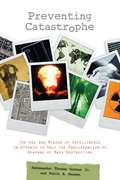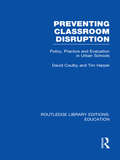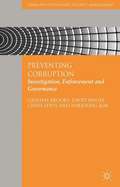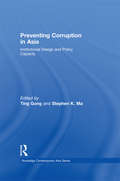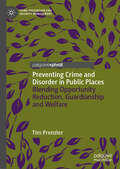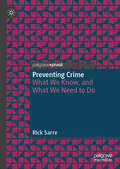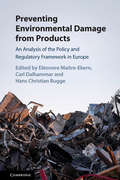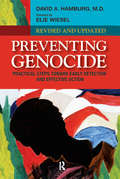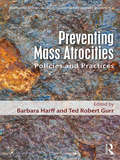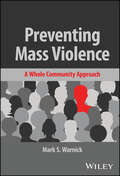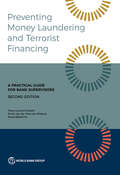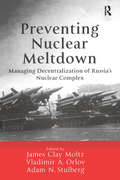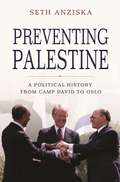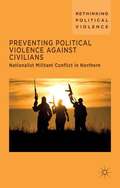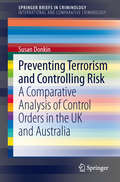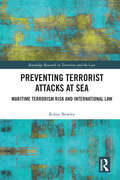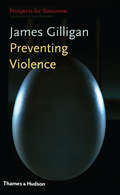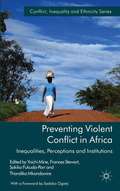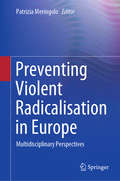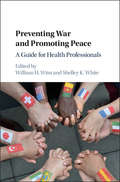- Table View
- List View
Preventing Catastrophe
by Keith Hansen Thomas Graham Jr.Preventing Catastrophe is written by two authors who are experienced "Washington hands" and who understand the interplay between intelligence and policymaking. Both have been personally involved, in the United States and overseas, in pursuing national and international measures to stop the proliferation of weapons of mass destruction. Their extensive experience is evident in this book, which puts the Iraqi WMD issue in proper perspective, explains the challenge of monitoring small clandestine programs, and explains how the effort to prevent terrorist acquisition and use of WMD differs from preventing their acquisition and use by nation states. At the same time, the authors are able to make a complex subject understandable to non-technical experts, making this book a useful teaching tool, especially for those who have little or no knowledge or experience in US national security decision making. "National intelligence and international inspections are necessary to create confidence that violations of non-proliferation commitments are detected in time to permit appropriate action. Both must be pursued with professionalism and critical minds avoiding poor intelligence or cosmetic inspections. The issues studied thoroughly and with good judgment in this welcome volume by Graham and Hansen were intensely controversial in the case of Iraq but remain central to international counter-proliferation efforts."--Hans Blix, Executive Chairman of the Weapons of Mass Destruction Commission
Preventing Classroom Disruption: Policy, Practice and Evaluation in Urban Schools (Routledge Library Editions: Education)
by Tim Harper David CoulbyThere has always been considerable debate about the best solutions to deal with disruptive behaviour in schools. On the one hand is the strategy of segregating disruptive pupils while on the other is a commitment to keeping such pupils in the ordinary school. This book advocates the latter philosophy and examines the best ways of coping with the problem. These concern both teacher skills and school organisational flexibility. In addition, the authors propose the provision of a support team whereby local authorities can help schools, teachers and children with problems of disruption without setting up ‘sin-bins’. Change is thus shown to be possible at three levels – teachers, headteachers and local authorities. Detailed illustrative case material is presented throughout the book.
Preventing Corruption
by David Walsh Chris Lewis Graham Brooks Hakkyong KimThis book reveals the extent, types, investigation, enforcement and governance of international corruption. Providing a unique international coverage, it reveals the limits of current anti-corruption strategies and explores the involvement of western democratic states in corruption.
Preventing Corruption in Asia: Institutional Design and Policy Capacity (Routledge Contemporary Asia Series #Vol. 15)
by Ting Gong Stephen K. MaDespite intensified governmental and public efforts at corruption control in recent years, official transgression continues to surface in various ways of abusing the unique power and trust that a government holds. Preventing Corruption in Asia addresses a number of crucial questions: -What institutional arrangements are necessary to ensure a clean and honest government? - What self-regulatory capabilities must government institutions develop in order to maintain integrity? -How should a sense of ethical responsibility be instilled in the civil services? -Do special anti-corruption agencies help keep government clean? -How will a regulatory framework of official conduct work properly? -How useful are anti-corruption campaigns in containing corruption? Focusing on a number of carefully selected countries in the Asia and Pacific region, the book sets as its focal point the choice of institutional design in preventing corruption, rather than treating corruption as a practical or technical problem to be corrected by strong political will and good anti-corruption policy measures. While focusing on institutional designs and policy choices, the book also examines other aspects of clean government such as the social environment, legal and regulatory framework, role of the public, and the impact of culture.
Preventing Crime and Disorder in Public Places: Blending Opportunity Reduction, Guardianship and Welfare (Crime Prevention and Security Management)
by Tim PrenzlerThis accessible, short book provides scientifically informed guidance on effective wholistic place management strategies for preventing crime. It integrates theoretical perspectives and practical examples of crime prevention methods that can be readily implemented by responsible stakeholders. It covers locations including town centers, shopping malls, parks, beaches, transit hubs, campuses, stadiums and entertainment precincts, where security programs sometimes attract criticism regarding the exclusion or persecution of marginalized groups. This book advocates for overlapping forms of crime prevention and social support that address the need to make large improvements in safety in public places while supporting marginalized and vulnerable groups. Readers are exposed to a wide range of successful case studies as well as the central role of a systematic problem-solving methodology. It speaks to crime prevention and social services professionals, academics, and students, as well as interested members of the public.
Preventing Crime: What We Know, and What We Need to Do
by Rick SarreThis book summarises the latest findings of Australian and international crime prevention researchers and suggests how future policies based upon their evidence could and should be better shaped and employed by policymakers. Governments all over the world are constantly endeavouring to make their communities safer and the lives of their citizens less fearful. For decades now, criminological researchers, challenged to assist in this task, have been asking: “What is working to reduce crime?” “What could work better in preventing crime before it erupts?” “What have we not tried, but could try in the field of crime control?” Pleasingly, the research outputs on this subject are voluminous and growing. They regularly inform policymaking in productive ways. This, in turn, has led and continues to lead to good crime prevention outcomes, but a lot more could be done. The author sets out twelve key priorities, designed to reduce victimisation, and tackle street crime and white-collar crime especially, each of them based upon a social justice framework. These priorities draw upon his extensive writings on the topic of law and criminology over the past forty years. There is, he concludes, far more value in tackling the societal factors that allow crime to emerge, grow and persist than applying a strict application of the criminal law and the justice system that feeds upon it.
Preventing Environmental Damage from Products: An Analysis Of The Policy And Regulatory Framework In Europe
by Carl Dalhammar Hans Christian Bugge Eléonore Maitre-EkernHow to tackle environmental damage from the throwaway society is one of the defining questions of the twenty-first century. By establishing a circular economy, we can encourage and support sustainable production and consumption. <P><P>These essays by an international group of leading scholars from a range of disciplines analyse policies and legal instruments and challenge mainstream assumptions, from the choice of a policy mix to the actual effect of imposing standards on the market, and from corporate objectives and priorities to the use of precaution in assessing particularly harmful substances. <P>Each chapter contributes to a better understanding of the current policy and regulatory framework in Europe and identifies the challenges and opportunities ahead. The book breaks new ground by examining how product policies can contribute to important objectives and visions, such as the aims of the circular economy. It is a must-read for researchers as well as for policymakers and practitioners.<P> Explores a very topical but under-researched field.<P> Opens new perspectives on environmental product regulation.<P> Illustrates arguments with concrete examples from the law and from the practice.
Preventing Genocide: Practical Steps Toward Early Detection and Effective Action
by David A. HamburgGenocide has been called 'a problem from hell' and despite vehement declarations of 'never again' it's a problem that continues to plague the world. From the beginning of history to the most recent massacres in Bosnia, Rwanda, and Darfur, genocide defies resolution. And given today's worldwide access to highly lethal weapons and advanced communications technology facilitating incitement to hate, we can expect to see this problem grow. It is often claimed that genocide occurs without warning, taking both local and global communities by surprise. Yet, as David Hamburg convincingly shows, we have had long-term advance knowledge of most modern genocides dating back to the early 20th century Armenian tragedy in Turkey and before. In this book, Dr. Hamburg applies a groundbreaking new perspective-the medical model of prevention-to the scourge of genocide in the world. Preventing genocide is not only possible, Dr Hamburg contends, but essential given its high cost in lives, human rights, and international security. Here he maps out numerous practical steps to recognise genocidal conflicts early and stem their tides of violence before they become acute. He also outlines several institutions in place and programs underway at the UN, EU, and NATO devoted to preventing future genocides before they erupt. He draws lessons both from missed opportunities and successful experiences and makes many constructive suggestions about strengthening international institutions, governments, and NGOs for this purpose.
Preventing Ideological Violence
by Basia Spalek P. Daniel Silk Mary O’raweThis book presents the voices of police and community members who have been involved in engagement and partnership projects designed for countering violent extremism. Though the threat of the so-called Islamic State garners a great deal of current attention, the book explores ideological violence prevention efforts in a number of contexts, to include that of paramilitary organizations as well as Qa'ida inspired actors.
Preventing Mass Atrocities: Policies and Practices (Routledge Studies in Genocide and Crimes against Humanity)
by Barbara Harff Ted Robert GurrWhat can be done to warn about and organize political action to prevent genocide and mass atrocities? The international contributors to this volume are either experts or practitioners, often both, who have contributed in substantial ways to analyzing high risk situations, recommending preventive policies and actions, and in several instances helping to organize remedial actions. Whereas current literature on the prevention of genocide is theoretically well grounded, this book explores what can be done, and has been done, in real-world situations. Recommendations and actions are rooted in a generation of experience, based on solid historical, comparative, and empirical research and with a grounding in quantitative methods. This volume examines historical cases to understand the general causes and processes of mass violence and genocide, and engages with ongoing genocidal crises including Darfur and Syria, as well as other forms of related violence such as terrorism and civil conflict. It will be key reading for all students and scholars of genocide, war and conflict studies, human security and security studies in general.
Preventing Mass Violence: A Whole Community Approach
by Mark S. WarnickBuild your community's ability to be proactive toward preventing mass violence In the past decade, communities across America have grappled with an alarming surge in mass violence incidents, leaving citizens and authorities alike seeking effective prevention strategies. In Preventing Mass Violence: A Whole Community Approach, Dr. Mark S. Warnick draws on his extensive experience as a first responder to provide a comprehensive blueprint for thwarting mass shootings, terrorist acts, and other large-scale violence. Emphasizing a collaborative "whole community" model, Warnick advocates for robust cooperation among law enforcement, emergency services, businesses, schools, healthcare providers, and the public. Through actionable insights, readers will discover practical methods to cultivate resilience and deter various forms of violence, from mass shootings to vehicular attacks. With a focus on prevention, the book equips readers with strategies to identify and address concerning behaviors, empowering law enforcement agencies and other stakeholders to navigate operational challenges effectively. Tailored for law enforcement professionals, public safety workers, healthcare personnel, educators, local governments, and organizations with emergency protocols, Preventing Mass Violence is an indispensable resource for safeguarding communities and mitigating the profound human and economic toll of such incidents.
Preventing Money Laundering and Terrorist Financing, Second Edition: A Practical Guide for Bank Supervisors
by Pierre-Laurent Chatain Emile van der Does de Willebois Maud BökkerinkMoney laundering and terrorist financing undermine the integrity and stability of financial systems and can have a significantly adverse impact on a jurisdiction's economy. Challenges to effective supervision and prevention of money laundering and financing of terrorism were exacerbated in the aftermath of the 2008 financial crisis, with financial institutions' need for funds at times undermining vigilance as to the provenance of those funds. As such, supervisors often, and prudently, focused on coping with the crisis. Since 2009, when the first edition of this handbook was published, challenges to the integrity and stability of financial systems have continued to evolve. Money-laundering and terrorist-financing risks continue to threaten the reputations of financial institutions and entire financial sectors, exposing institutions to the possibility of severe enforcement action by public authorities or the loss of correspondent relationship facilities by their private sector counterparts. This second edition reflects the evolving challenges to the integrity and stability of financial systems, recent trends in enforcement actions by country authorities, and changes to international standards, notably an emphasis on a risk-based approach. This practical handbook supports the implementation of international standards established by the Financial Action Task Force and other bodies, * Providing examples of money-laundering and terrorist-financing supervisory frameworks in a range of countries; * Describing best practices for the supervision and enforcement of money-laundering and terrorist-financing laws and regulations; * Offering practical advice on how a particular jurisdiction might incorporate enforcement of the laws and regulations on money laundering and terrorist financing into its supervisory framework. Designed specifically for bank supervisors, this guide will also be of interest to readers working in the areas of finance, corruption prevention, law, accounting, and corporate governance.
Preventing Nuclear Meltdown: Managing Decentralization of Russia's Nuclear Complex
by James Clay Moltz Adam N. Stulberg Vladimir A. OrlovThe decline in central financing for Russia's nuclear complex and the known interest of terrorist groups in acquiring fissile material and technologies, has made the state of Russia's far-flung nuclear enterprises a pressing international issue. In this important volume, a group of leading US and Russian policy experts - drawing on extensive interviews with officials, facility personnel, and analysts in Russia's regions - explores the intersecting problems of Russian nuclear insecurity and decentralization, including the growing influence of regional, political and economic forces. The work presents insights into both nuclear safety issues and post-Soviet intra-agency governance, as well as detailed case studies of critical nuclear regions: the Far East, the Urals, Siberia, and the Volga area. The volume also offers major new findings on the interface linking Russia's evolving center-periphery relations, its ailing nuclear facilities, and the role played by foreign assistance providers.
Preventing Palestine: A Political History from Camp David to Oslo
by Seth AnziskaOn the fortieth anniversary of the Camp David Accords, a groundbreaking new history that shows how Egyptian-Israeli peace ensured lasting Palestinian statelessnessFor seventy years Israel has existed as a state, and for forty years it has honored a peace treaty with Egypt that is widely viewed as a triumph of U.S. diplomacy in the Middle East. Yet the Palestinians—the would-be beneficiaries of a vision for a comprehensive regional settlement that led to the Camp David Accords in 1978—remain stateless to this day. How and why Palestinian statelessness persists are the central questions of Seth Anziska’s groundbreaking book, which explores the complex legacy of the agreement brokered by President Jimmy Carter.Based on newly declassified international sources, Preventing Palestine charts the emergence of the Middle East peace process, including the establishment of a separate track to deal with the issue of Palestine. At the very start of this process, Anziska argues, Egyptian-Israeli peace came at the expense of the sovereignty of the Palestinians, whose aspirations for a homeland alongside Israel faced crippling challenges. With the introduction of the idea of restrictive autonomy, Israeli settlement expansion, and Israel’s 1982 invasion of Lebanon, the chances for Palestinian statehood narrowed even further. The first Intifada in 1987 and the end of the Cold War brought new opportunities for a Palestinian state, but many players, refusing to see Palestinians as a nation or a people, continued to steer international diplomacy away from their cause.Combining astute political analysis, extensive original research, and interviews with diplomats, military veterans, and communal leaders, Preventing Palestine offers a bold new interpretation of a highly charged struggle for self-determination.
Preventing Political Violence Against Civilians: Nationalist Militant Conflict in Northern Ireland, Israel and Palestine (Rethinking Political Violence)
by Aoibhín De BúrcaThe increased targeting of civilians by militants raises serious and profound questions for policy-makers. Examining conflict in Northern Ireland, Israel and Palestine, this book focuses on ethno-nationalist militant groups and formulates a model to constrain violence against civilians.
Preventing Regulatory Capture
by David A. Moss Daniel CarpenterWhen regulations (or lack thereof) seem to detract from the common good, critics often point to regulatory capture as a culprit. In some academic and policy circles it seems to have assumed the status of an immutable law. Yet for all the ink spilled describing and decrying capture, the concept remains difficult to nail down in practice. Is capture truly as powerful and unpreventable as the informed consensus seems to suggest? This edited volume brings together seventeen scholars from across the social sciences to address this question. Their work shows that capture is often misdiagnosed and may in fact be preventable and manageable. Focusing on the goal of prevention, the volume advances a more rigorous and empirical standard for diagnosing and measuring capture, paving the way for new lines of academic inquiry and more precise and nuanced reform.
Preventing Terrorism and Controlling Risk
by Susan DonkinThis Brief takes a provocative look at existing socio-legal literature with a comparative study of terrorism control orders, focusing on how the concept of pre-emption fits within a traditional criminological framework. This timely work examines how such measures might be conceived and interpreted within a situational crime prevention approach. Over the past decade, socio-legal scholars have identified a rise in pre-emptive control mechanisms to respond to terrorism and other threats in the post-9/11 world. Many have argued that this pre-emptive rationale has been used to justify the introduction of measures that transcend established legal and risk frameworks, to deal with individuals or groups thought to pose a threat to the state or its citizens. Preventing Terrorism and Controlling Risk: A Comparative Analysis of Control Orders in the UK and Australia will be of interest to researchers in Criminology and Criminal Justice, particularly with a focus on terrorism, risk assessment, and human rights.
Preventing Terrorist Attacks at Sea: Maritime Terrorism Risk and International Law (Routledge Research in Terrorism and the Law)
by Robin BowleyOver recent decades, it has been widely recognised that terrorist attacks at sea could result in major casualties and cause significant disruptions to the free flow of international shipping. After discussing the overlaps and distinctions between piracy and maritime terrorism, this book considers how the International Ship and Port Facility Security Code, and other vessel identification and tracking measures in the 1974 International Convention for the Safety of Life at Sea, would be likely to reduce the risk of terrorist attacks at sea. It explains how the 1982 United Nations Convention on the Law of the Sea is less than clear on the powers of states to protect offshore installations, submarine cables and pipelines from interference by terrorists. In light of these uncertainties, it considers how the 2005 Protocol to the Convention for the Suppression of Unlawful Acts Against Maritime Navigation, the doctrine of necessity and states’ inherent self-defence rights might apply in the maritime security context. A significant contribution of the book is the formulation of the Maritime Terrorism Threat Matrix, which provides a structured framework for examining how maritime terrorism incidents have occurred, and might occur in the future. The book also examines the relevant national maritime security legislation for preventing maritime terrorist attacks in the United Kingdom and in Australia. The book concludes by formulating guidelines for the unilateral interdiction of suspected terrorist vessels in exceptional circumstances, and recommending priorities for governments and international maritime industries to focus on in order to reduce the risk for terrorist attacks at sea. It will be of interest to those working in the areas of Law and Terrorism, Law of the Sea, Maritime Law and Insurance and International Law.
Preventing Violence (Prospects for Tomorrow)
by James GilliganIn this controversial and compassionate book, the distinguished psychiatrist James Gilligan proposes a radically new way of thinking about violence and how to prevent it. Violence is most often addressed in moral and legal terms: "How evil is this action, and how much punishment does it deserve?" Unfortunately, this way of thinking, the basis for our legal and political institutions, does nothing to shed light on the causes of violence. Violent criminals have been Gilligan's teachers, and he has been their student. Prisons are microcosms of the societies in which they exist, and by examining them in detail, we can learn about society as a whole. Gilligan suggests treating violence as a public health problem. He advocates initiating radical social and economic change to attack the root causes of violence, focusing on those at increased risk of becoming violent, and dealing with those who are already violent as if they were in quarantine rather than in constraint for their punishment and for society's revenge. The twentieth century was steeped in violence. If we attempt to understand the violence of individuals, we may come to prevent the collective violence that threatens our future far more than all the individual crimes put together.
Preventing Violent Conflict in Africa
by Yoichi MineHorizontal inequalities are root causes of violent conflict in Africa. Yet, people take actions not because of statistical data on inequalities, of which they might not be aware, but because of injustices they perceive. This volume analyses the results of original surveys with over 3,000 respondents in African cities and towns, exposing clear discrepancies between objective inequalities and people's subjective perceptions. The contributors examine experiences in country pairs and probe into the reasons why neighbouring countries, sharing common historical traits, sometimes took contrasting pathways of peace and violent conflict. Combining quantitative analysis and qualitative anatomy of historical experiences of conflict and reconciliation in Rwanda, Burundi, Ghana, C#65533;te d'Ivoire, South Africa, Zimbabwe, Uganda, Tanzania, Kenya and Nigeria, the study brings forward a set of policy recommendations for development practitioners. This work further addresses the issue of institutional choice and reveals how sustainable power-sharing and decentralisation contribute to political stability in Africa.
Preventing Violent Radicalisation in Europe: Multidisciplinary Perspectives
by Patrizia MeringoloThis book brings together the latest literature and European experiences on preventing youth violent radicalisation and violent actions in intergroup relations. Youth violent radicalisation is a significant problem within the European context, and requires an exploration of how various social actors can play an active role in preventing radicalisation in minors and young adults. This complex issue needs to be explored through a multidisciplinary approach, and effective operational models are needed in order to tackle it. This book describes the theoretical framework for such an approach in all its facets. The book’s originality lies in its psychosocial and participatory approach, aimed at improving results through professional training and community empowerment for building trusting relationships and educational activities. It also proposes “alternative narratives”, which are a way of representing people and groups within a social context, thereby overcoming stereotyped visions and stigma. This book focuses on participation and communication among stakeholders, social inclusion, strengthening democratic values, and pursuing a proactive instead of a reactive approach to preventing radicalisation. Highly topical, the book will appeal to researchers and students of the social and behavioural sciences interested in youth radicalisation, including social work and social policy, as well as practitioners working within the juvenile justice system.
Preventing War and Promoting Peace: A Guide for Health Professionals
by William H. Wiist Shelley K. WhitePreventing War and Promoting Peace: A Guide for Health Professionals is an interdisciplinary study of how pervasive militarism creates a propensity for war through the influence of academia, economic policy, the defense industry, and the news media. Comprising contributions by academics and practitioners from the fields of public health, medicine, nursing, law, sociology, psychology, political science, and peace and conflict studies, as well as representatives from organizations active in war prevention, the book emphasizes the underlying preventable causes of war, particularly militarism, and focuses on the methods health professionals can use to prevent war. Preventing War and Promoting Peace provides hard-hitting facts about the devastating health effects of war and a broad perspective on war and health, presenting a new paradigm for the proactive engagement of health professions in the prevention of war and the promotion of peace.
Preventing War: The United Nations and Macedonia
by Abiodun WilliamsDescribes the role the UN played in Macedonia.
Preventing a Biochemical Arms Race
by Alexander Kelle Kathryn Nixdorff Malcolm DandoPreventing a Biochemical Arms Raceresponds to a growing concern that changes in the life sciences and the nature of warfare could lead to a resurgent interest in chemical and biological weapons (CBW) capabilities. By bringing together a wide range of historical material and current literature in the field of CBW arms control, the book reveals how these two disparate fields might be integrated to precipitate a biochemical arms race among major powers, rogue states, or even non-state actors. It seeks to raise awareness among policy practitioners, the academic community, and the media that such an arms race may be looming if developments are left unattended, and to provide policy options on how it - and it's devastating consequences - could be avoided. After identifying weaknesses in the international regime structures revolving around the Biological Weapons and Chemical Weapons Conventions, it provides policy proposals to deal with gaps and shortcomings in each prohibition regime individually, and then addresses the widening gap between them.
Preventing and Countering Extremism and Terrorist Recruitment: A Best Practice Guide
by Hanif QadirHanif Qadir is recognised as one of the world's leading specialists in positively transforming violent extremists. He has worked with hundreds of high-risk terrorist and violent extremist cases and has challenged many known figureheads who lead violently extreme groups both at home and abroad. In this essential book for all those who work with young people, Hanif outlines the push and pull factors and the early indicators of radicalisation, and offers decisive and unambiguous advice on how and when to intervene. The book includes anonymous case studies of a wide variety of people Hanif has personally worked with and lays down simple lessons on what success and failure looks like when tackling extremism.
